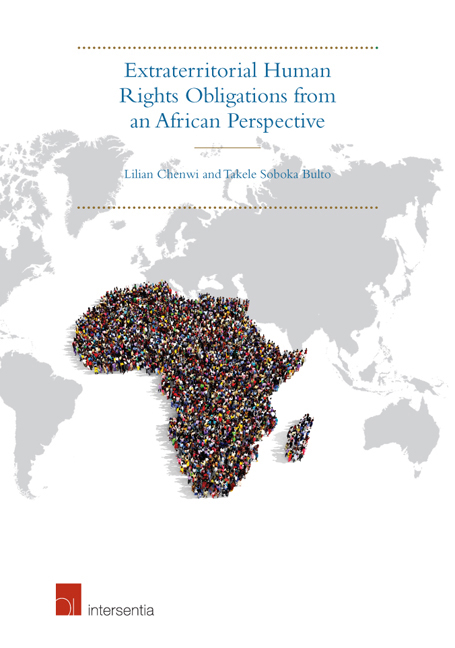Book contents
- Frontmatter
- Dedication
- Foreword
- Preface
- Contents
- List of Cases, Advisory Opinions and Other Decisions
- List of Treaties and Other Instruments
- About the Contributors
- Introduction
- Extraterritoriality in the African Regional Human Rights System from a Comparative Perspective
- Commercialisation of Educational Services and Extraterritorial Human Rights Obligations
- Extraterritorial Human Rights Obligations in the Context of Development Assistance to African States
- The Right to Food Beyond Borders: The Extraterritorial Reach of the Right to Food in Africa
- Extraterritorial Application of the Right to Water under the African System for the Protection of Human Rights
- Tortured Unity: United States–Africa Relations in Extraordinary Renditions and States’ Extraterritorial Obligations
- Indigenous Communities Displaced by Climate Change and Extraterritorial Application of States’ Obligations in Africa
- Land Grabbing, Extraterritorial Obligations and the Failure of Justice in Uganda: The Mubende Case
- Extraterritorial Obligations of Uganda for its Military's Failure to Respect and Protect Civilians in Areas of the Lord's Resistance Army Activity
- Bibliography
- Index
Indigenous Communities Displaced by Climate Change and Extraterritorial Application of States’ Obligations in Africa
Published online by Cambridge University Press: 21 September 2018
- Frontmatter
- Dedication
- Foreword
- Preface
- Contents
- List of Cases, Advisory Opinions and Other Decisions
- List of Treaties and Other Instruments
- About the Contributors
- Introduction
- Extraterritoriality in the African Regional Human Rights System from a Comparative Perspective
- Commercialisation of Educational Services and Extraterritorial Human Rights Obligations
- Extraterritorial Human Rights Obligations in the Context of Development Assistance to African States
- The Right to Food Beyond Borders: The Extraterritorial Reach of the Right to Food in Africa
- Extraterritorial Application of the Right to Water under the African System for the Protection of Human Rights
- Tortured Unity: United States–Africa Relations in Extraordinary Renditions and States’ Extraterritorial Obligations
- Indigenous Communities Displaced by Climate Change and Extraterritorial Application of States’ Obligations in Africa
- Land Grabbing, Extraterritorial Obligations and the Failure of Justice in Uganda: The Mubende Case
- Extraterritorial Obligations of Uganda for its Military's Failure to Respect and Protect Civilians in Areas of the Lord's Resistance Army Activity
- Bibliography
- Index
Summary
INTRODUCTION
Displacement has been much discussed in literature as one of the negative consequences of climate change. In relation to the connection between climate change and displacement, whether voluntary or forced, within or outside national boundaries, writers identify two schools of thought. Drawing no distinction between displacement directly caused by climate change and indirectly caused by other factors linked with it, the maximalist school generalises that no fewer than hundreds of millions of people will be displaced as a result of climate change. On the contrary, the minimalists posit that there will be little displacement due to strict causal links with climate change. Notwithstanding this distinction, there is consensus that climate-related disasters, including windstorms, heavy rainfall, flooding and drought are a great cause of displacement.
Indigenous communities are vulnerable to climate change even though details of their circumstances in the context of displacement in Africa are scanty. Whether obligations of states arising under regional human rights instruments can apply extraterritorially for the protection of those communities is not clear. Generally, in addressing the challenge of displacement posed by climate change, some writers argue the need for a convention dealing with climate-displaced persons. Other authors, notably McAdam, argue that a treaty without wide ratification and implementation cannot address the humanitarian issues raised by climate change. No one has yet examined whether there are instruments and applicable jurisprudence at the regional level that can be engaged for the protection of indigenous communities facing displacement due to climate change in Africa. This chapter presents evidence of climate-related displacement as it relates to indigenous communities, and argues that there is a normative basis and applicable jurisprudence at the regional level which can be invoked for their extraterritorial protection in Africa.
2. INDIGENOUS COMMUNITIES AND CLIMATE-RELATED DISPLACEMENT
In Africa, as elsewhere, even though indigenous communities have contributed least to climate change, according to the United Nations Development Group (UNDG) Guidelines on Indigenous Peoples Issues of 2008,’ they are among the first to face its impact’. While the application of the concept of indigenous communities is contested by political leadership in Africa, in identifying these communities, the African Commission's Working Group of Experts on Indigenous Populations/Communities (Working Group) has adopted an approach which focuses on the following criteria:
- Type
- Chapter
- Information
- Publisher: IntersentiaPrint publication year: 2018



